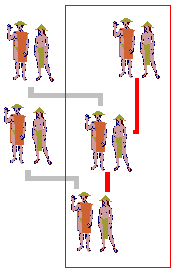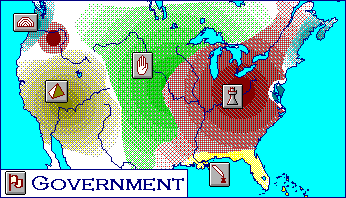
Secretarial States

The problem has always been where to find good help.
Specifically, where can the ruling warlords of Medieval America find enough educated bureaucrats to manage their estates? And how do you keep the bureaucrats from taking over and placing their own children in the Governor's office? Since the warlords are too busy training for war, they can't do it themselves. They usually don't have enough book learning to do more than sign an arrest warrant or tally a body count. In the Forest Zone, the warlords hire celibate churchman to staff the civil service. In the Desert Zone, they raise castrated peasant children for the job. In a few places, however, the warlords train the women from their own familes as secretaries. The women of the nobility usually have enough time on their hands anyway, and it immediately eliminates the problem of divided loyalties if the military and civilian branches of government are husband and wife.
This is such an obviously good solution to the problem that it's a wonder that no one outside of the Medieval Caribbean has tried it, but it's clearly a function of the general status of women in barbarian societies. Although many sociologists believe that any society dominated by men is going to be extremely warlike because men are supposedly more brutal than women, this attitude is probably a mix-up of cause and effect. In an era of chronic warfare, such as the Middle Ages, a nation lives or dies according to its men's ability to fight. Since women have less brute strength than men, they are clearly secondary in importance, and they serve only as domestic labor, breeding stock and trophies to be awarded to the most valiant warriors.
In societies where brute strength is less important, women can aspire toward equality. In the Industrial Era, for example, with machinery doing most of the working (and the killing), it became less necessary to reserve important jobs for men. Similarly, in the subtropical regions, where most of the important crops are grown using hoes rather than ox-drawn plows, men have no monopoly over the food production. Also, as the islands of the Caribbean tend to be populated up to carrying capacity, there is less pressure on women to raise a family, which leaves them free to pursue a career, although this being the Middle Ages, a career usually means menial, manual labor.
It also probably helped that the New Middle Ages emerged from a society that believed that giving women a bit of equality was not entirely ridiculous, and this attitude clung to life here and there.
The secretarial states are matrilineal in family structure; that is, a person tracks descent through his mother's family rather than his father's, and property passes from mother to daughter. (Actually, it passes from father-in-law to son-in-law. Male dominance of society is only moderated, not abandoned, because wars are still fought hand-to-hand.) They are also matrilocal; newlywed couples move into the household of the wife's parents, not the husband's parents. This creates a family in which all the women of the household are blood kin, rather than unrelated strangers, as they would be in a patrilocal society. In fact, it's the various sons-in-law and brothers-in-law who are the strangers in these households.

Matrilinear (and -local) cultures are actually rather common worldwide, and they often arise wherever long-distance war and trade require the men to be absent from their homes for long periods. Rather than leaving the family property in the hands of bickering women from different families (mother-in-law, daughters-in-law, sisters-in-law), matrilinear societies create a cohesive household of kinswomen with a unified family loyalty (mother, daughters, sisters). Because it is necessary for the men of the Caribbean archipelago to go island hopping if they want to perform any useful trading or plundering, they've learned it's best to leave behind a well-ordered matrilinear household.
In most of the cultures of Medieval America, a groom expects his father-in-law to pay him a dowry to offset the expenses of keeping a wife. In the Caribbean, however, the groom pays a bride-price to the father-in-law to offset the cost of adding a son-in-law to the household. This practice incidently helps create an attitude that daughters are valuable commodities to be purchased rather than burdens to be dumped.
Although the secretarial states are for the most part outside of our study area, they have occasionally taken root in some of the southern states of the North American continent, and Louisiana and Florida are pretty much permanently secretarial in their social structure. Men throughout North America therefore consider the men of Louisiana and Florida to be pussy-whipped weenies.


Last Updated June 2003
Copyright © 2003 Matthew White